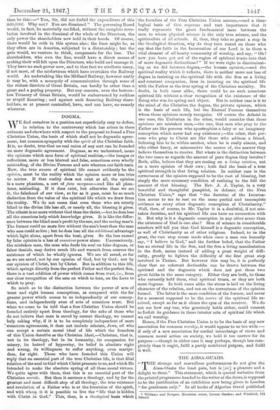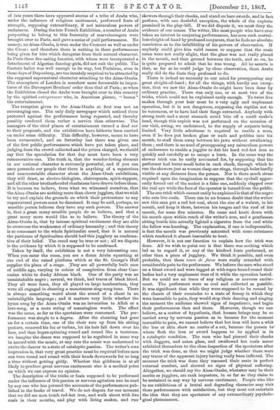THE AISSA-OUAHS.
THE strange and marvellous performances do not give the Aissa-Ouahs the least pain, but is [sic] a pleasure and a delight to them." This statement, which is quoted verbatim from the printed programme handed to the writer at the doors, is supposed to be the justification of an exhibition now being given in London "for gentlemen only." In all books or Algerian travel published
• Williams and Norgate, Henrietta street, Covent Garden; and Whitfield, 178 Strand.
of late years there have appeared stories of a tribe of Arabs who, under the influence of religious excitement, performed feats of strength, supposing extraordinary, if not miraculous powers of endurance. During the late French Exhibition, a number of Arabs purporting to belong to this fraternity of marvelmongers were brought over to Paris, and gave a series of paid performances. No money, no Aissa-Ouahs, is true under the Crescent as well as under the Cross ; and therefore there is nothing in these performances being given for hire which derogates from their normal character. In Paris these fire-eating fanatics, with whom were incorporated a detachment of Algerian dancing-girls, did not suit the public. The Eastern ballet was well enough in its way, but Parisians, even in these days of Dupanloup, are too innately sceptical to be attracted by the supposed supernatural character attaching to the Aissa-Ouahs. The atmosphere of London is somehow more favourable to impos- tures of the Davenport Brothers' order than that of Paris ; so when the Exhibition closed the Arabs were brought over to this country by the spirited entrepreneur who, in American phrase, " bosses" the entertainment.
The reception given to the Aiasa-Ouahs at first was not an encouraging one. The only daily newspaper which noticed them protested against the performance being repeated, and thereby possibly rendered them rather a service than otherwise. The managers of the chief places of entertainment turned a deaf ear to their proposals, and the exhibitions have hitherto been carried on under some difficulty. This difficulty, however, seems to have been surmounted, and on Saturday last there was given one of the first public performances which have yet taken place, and judging from the crowd collected and the prices charged, we should say that the speculation for that day must have been a very remunerative one. The truth is, that the wonder-loving element in our national character is extremely powerful, and if you can once persuade our people that there is anything of a mysterious and unaccountable character about the Aissa-Ouah exhibitions, they will draw, as electro-biologists, clairvoyants, spirit-rappers, and all the other brotherhoodof charlatans have drawn before them. It is because we believe, from what we witnessed ourselves, that the Aissa-Ouahs are nothing more than clever jugglers, that we wish -to try and explain the grounds on which their pretensions to any supernatural powers must be dismissed. It may be said, perhaps, no sensible person believes they have any such powers. The answer is, that a great many sensible people do so believe, and that a great many more would like so to believe. The theory of the Aissa-Ouahs is, that by intense spiritual excitement they are able to overcome the weaknesses of ordinary humanity ; and this theory is so consonant to the whole Spiritualist creed, that it is natural the partizans of Spiritualism should hail this jugglery as confirma- tive of their belief. The creed may be true or not ; all we dispute is the evidence by which it is supposed to be confirmed.
Taken by itself, the exhibition is not a very interesting one. When you enter the room, you see a dozen Arabs squatting at one end of the raised platform which at the St. George's Hall supplies the place of a stage. They are all powerfully built men of middle age, varying in colour of complexion from clear Cau- casian white to dusky African black. One of the party was an unmistakable negro ; several, we think, had traces of black blood. They all wore fezes, they all played on large tambourines, they were all engaged in chanting a monotonous sing-song tune. There is always something weird about the sound of a chant in an unintelligible language ; and it matters very little whether the hymn sung by the Aissa-Ouahs was an invocation to Allah or a love-song, or a mere string of meaningless words. The effect was the same, as far as the spectators were concerned. The per- formance was simple to a degree. After the chanting had gone on for a certain time, one of the choir rose up from his sitting posture, removed his fez or turban, let his hair fall down over his face, and then began spinning round and round like a teetotum. we imagine the dance was supposed to be regulated in some way in accord with the music, at any rate the music was understood to excite the dancer to estate of cataleptic passion. The writer's own impression is, that very great practice must be required before men can turn round and round with their heads downwards for so long a time without getting giddy. Whether this giddiness is at all likely to produce great nervous excitement also is a medical point on which we can express no opinion.
The description of the tricks or feats supposed to be performed under-the influence of this passion or nervous agitation can be read by any one who has perused the accounts of the performances pub- lished in the books of travel. We do not dispute for one moment that we did see men touch red-hot iron, and walk about with live coals in their mouths, and play with living snakes, and run
skewers through their cheeks, and stand on bare swords, and in fact perform, with one doubtful exception, the whole of the exploits promised in the play-bill. If we did dispute it, we must deny the evidence of our senses. The writer, like most people who have ever taken an interest in conjuring performances, has seen such marvel- lous sleight-of-hand by professed conjurors, that he feels no absolute conviction as to the infallibility of his powers of observation. If anybody could give him valid reason to suppose that the coals eaten were not really alight, that the glass was not really placed in the mouth, and then ground between the teeth, and so on, he is quite prepared to admit that he was wrong. All he asserts is that, as far as he could judge by close observation, these Arabs really did do the feats they professed to do.
There is indeed no necessity to our mind for presupposing any great sleight-of-hand ; for all the things, with hardly one excep- tion, that we saw the Aissa-Ouahs do might have been done by ordinary practice. There was only one, or at most two of the tricks, which could not be explained easily enough. To twist live snakes through your hair must be a very ugly and unpleasant. operation, but it is not dangerous, supposing the reptiles not to. be venomous, or to have had their fangs extracted. Anybody with strong teeth and a stout stomach could bite off a small snake's. head, though this exploit was not performed on the occasion of our visit, owing, we understood, to the supply of serpents being limited. Very little adroitness is required to enable a man, even if he does put broken glass or nails and pebbles into his- mouth, to stuff them away between his jaws without swallowing them ; and there is no need of presupposing any miraculous powers of endurance to enable a juggler to dab his hard red-hot iron so. quickly and carefully as to escape a burn. In the same way the skewer trick can be easily accounted for, by supposing that the performer had burnt small holes in each cheek, through which he ran the skewers just as women clasp ear-rings, through holes hardly visible at any distance from the person. Nor is there much stress required upon the imagination to suppose that the eyeball appar- ently forced out of the socket is a false one, suddenly clapped over- the real eye while the face of the operator is turned from the public.
The one trick which cannot easily be explained is that of the negro- who eats live coals. There can be no human doubt that the writer- saw this man put a red hot coal, about the size of a walnut, in his month, and keep it there, between his tongue and the roof of his. mouth, for some five minutes. He came and knelt down with his mouth open within reach of the writer's arm, and a gentleman. sitting beside him actually lighted a cigarette from the coal while- the fellow was kneeling. The explanation, if one is indispensable, is that the mouth was previously saturated with some substance which rendered it almost insensible to heat.
However, it is not our function to explain how the trick was done. All we wish to point out is that there was nothing which. led us to regard it, or any of the kindred feats performed, as than a piece of jugglery. We think it possible, and even. probable, that these tours de force were really attended with. considerable pain to the performers. We believe the men who stood. on a blunt sword and were lugged at with ropes bound round their- bodies had a very unpleasant time of it while the operation lasted. But we could see no trace of any religious or nervous excite- ment. The performers were as cool and collected as possible.. It was significant that while they were supposed to be roused by the chants of their comrades to a state of frenzy in which they were insensible to pain, they would stop their dancing and singing the moment the audience showed signs of impatience, and begin, their performances then and there. Moreover, though we can- believe, as a matter of hypothesis, that human beings may. be so• carried away by nervous passion as to become for the moment insensible to pain, we cannot believe that hot iron will burn a whit the less or skin show no marks of a cut, because the person to: whose flesh the iron or sword happens to be applied is in a cataleptic condition. The men who had pierced their cheeks with daggers, and eaten glass, and swallowed hot coals never exhibited themselves to the close inspection of the spectators after the trick was done, so that we might judge whether there were any traces of the apparent, injury having really been inflicted. The moment the trick was done they resumed their seats in perfect external comfort, and showed no signs of physical suffering. Altogether, we should say the Aissa-Ouahs, whatever may be their merits as jugglers, are rank impostors, in as fax as they claim to- be sustained in any way by nervous excitement.. People who like to see exhibitions of a brutal and degrading character may visit these performances with satisfaction, but they must not entertain the idea that they are spectators of any extraordinery psycholo- gical phenomenon.







































 Previous page
Previous page